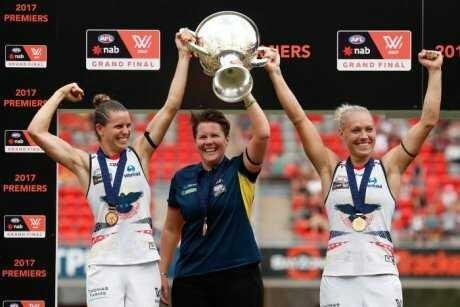
When Bec Goddard led Adelaide to the inaugural AFLW title in 2017, it was seen as a landmark moment for the code and women's sport in Australia more generally.
Barely a year later Goddard is gone. Replaced by a man.
Fremantle's experienced coach Michelle Cowan also walked away from her role, despite being of such standard as to be offered a full-time role with Melbourne's AFL set up just two years ago.
Season three of AFLW may now start without a single woman in charge.
It's a stark reminder of the challenges faced by aspiring women coaches in not just AFLW but all elite sport.
Fremantle Dockers women's players Kiara Bowers and Kara Donnellan stand either side of coach Michelle Cowan holding team jumpers
PHOTO Michelle Cowan coached the Fremantle Dockers in the first two seasons of AFLW but will not be in charge next season.
ABC NEWS: BLAKE KAGI
"I use the metaphor of the maze," says Dr Julia Walsh, a senior lecturer in sport coaching at Deakin University.
"As a female, if you want to coach, you're standing outside that maze and the lights are out and you've got to find your way through it.
"But if you're a male, there's people that have been there before so there's a light you can follow, and, in some cases, you've got a sat nav to work your way through the maze."
Both women were employed on a part-time basis due to the truncated AFLW season. It's believed Goddard wanted a full-time role, but the club was unable to offer her sufficient work outside of the women's program.
Goddard's replacement, Matthew Clarke, is already a full-time employee at the club, and he'll continue his role as assistant with the men's side.
There are specific circumstances, sporting and otherwise, pertaining to each decision, of course. But they are not truly isolated.
Matildas players embrace after scoring a goal
PHOTO The Matildas have a rotating assistant coach role shared by three women under a male coach.
AP: RAAD ADAYLEH
Four years ago, Peta Searle made headlines in becoming the AFL's first female coach with St Kilda. Her development in the men's game thereafter hit a roadblock. She now looks after a women's set up who have yet to enter the AFLW.
The AFL has told the ABC it is exploring options to build pathways for female coaches, but the problems it's facing are hardly unique.
At the Rio Olympics only 9 per cent of Australia's accredited high-performance coaches were women, down from 12 per cent in London.
Of the 40 head coach roles currently occupied in the NRLW, AFLW, Super W, W-League, WNBL, and WBBL, just 11 are women. Four of those are in the WBBL, the best represented with a 50/50 gender split.
Only in Super Netball are the majority of head coaches female. Seven of the eight teams are led by women, but in a sport that doesn't have a corresponding competition for men.
Navigating the maze
GWS midfielder Alicia Eva is one of the women setting out to navigate the maze.
She is pursuing a coaching career while playing, as head coach of NSW/ACT Youth Girls Academy and assistant with the Giants' Academy and the men's reserves team in the NEAFL.
GWS player Alica Eva celebrates scoring in the AFLW
PHOTO GWS player and budding coach Alica Eva believes opportunities are going to open up for women in the future.
Eva is less downbeat than some about the current landscape for female coaches in her sport.
"We can't forget that 10 years ago there wasn't a pathway for women as players," she says.
"I think as a result of that there wasn't really much of a pathway for women as coaches either.
"I think opportunities are certainly going to open up for women coming through."
Women's games a stepping stone for men
Former Matildas striker, and Football Federation Australia's (FFA) general manager of Women's Football, Sarah Walsh, identifies another impediment that is, paradoxically, a product of the increased professionalisation of women's sport.
"As soon as the product becomes a bit more attractive, men are then willing to work within there and earn an income and use it as a stepping stone into the men's game," she says.
"So, you'll see the women, due to cultural bias, lose out."
In the USA, a law known as Title IX was introduced in colleges in 1972, requiring, "women and men be provided equitable opportunities to participate in sports".
Before Title IX, 90 per cent of coaches across women's teams were female, that's now down to 40 per cent as, there too, male coaches have become interested in leading better-organised and better-resourced women's teams.
Hi! I am a robot. I just upvoted you! I found similar content that readers might be interested in:
http://www.abc.net.au/news/2018-05-25/aflw-where-have-all-the-female-coaches-gone-and-why/9798866
Downvoting a post can decrease pending rewards and make it less visible. Common reasons:
Submit
Thank you
Downvoting a post can decrease pending rewards and make it less visible. Common reasons:
Submit